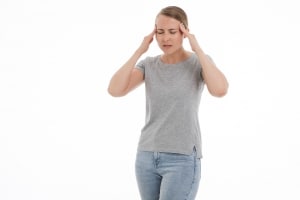 Why talk about Chronic Fatigue?
Why talk about Chronic Fatigue?
Today let’s talk a bit about chronic fatigue, what it is and how you can manage it. We spoke to Dan Thompson from Southend Acupuncture to hear his perspective on chronic fatigue and how you can include acupuncture and exercise in your routine to help with symptoms. Chronic Fatigues is very akin to Long Covid and many of the things that help chronic fatigue also have been found to help Long Covid.
I burned out in 2011. When I came back to work I knew I was really struggling to concentrate, but I did not know why. I felt tired and really struggled to concentrate. Luckily the works doctor spotted that all was not well and sent me to St Thomas Hospital for an assessment. I had a chronic fatigue syndrome called Fibromyalgia. Finally everything I was feeling made sense. From here I embarked on a journey of discover, recovery and resilience.
What is chronic fatigue?
Chronic fatigue syndrome is a long-term illness and is very common. There is an estimated 250,000 people who are affected by chronic fatigue syndrome in the UK alone. It usually develops between the ages of 20-40, and it is recognised more in women. It is recognised by a case of extreme tiredness that is not relieved through bed rest and is not related to any underlying medical condition. Although the main symptom is fatigue, that isn’t the only common symptom. Other symptoms can include:
- Poor concentration
- Brain fog
- Pain in joints and muscles
- Headaches
- Sleeping problems such as insomnia
- Extreme tiredness
A range of different symptoms means there is no one way to treat or manage chronic fatigue, it cannot be generalised. It is very different for each individual, therefore dealing with the symptoms needs a flexibility and combination of things in order to help with the illness.
How can you manage chronic fatigue?
When figuring out the best solution to dealing with chronic fatigue symptoms, there are a lot of factors to think about. You must of course take into consideration your nutrition and diet, hereditary factors, constitutional factors and emotional factors. These all contribute to long term chronic fatigue syndrome. Additionally, trauma can be a trigger. Trauma triggers a physical response, and this can result in your body going into a fight or flight response.
When dealing with a negative emotion or unresolved trauma, our bodies will naturally go into a fight/flight state. This is where the sympathetic nervous system is triggered, starting a whole host of chain reactions throughout the body. The brain sends a trigger through the nervous system and our adrenal gland will produce adrenaline and noradrenaline. This can induce an increased heart rate, muscle tension, sweating and shallow breathing. These responses are actually vital to how we learn to cope with uncomfortable or negative situations. The fight or flight response is part of our body telling us when we are in danger and preparing us to act on it. We tend to react with the options of fleeing, freezing or fighting, hence the name “fight or flight.”
However, our body cannot always tell when a threat is real or not, so even if there is not any actual danger we still respond in this way. Some people have a little more sensitivity to these situations, such as those with anxiety, PTSD or in this case, Chronic Fatigue Sydrome, which is why the fight or flight response is triggered more than usual.
How can acupuncture help?
Acupuncture can actually help regulate your fight or flight. By putting a needle into the right pressure point it triggers our rest response right away (The opposite of fight or flight). By having regular treatments to help regulate the fight or flight, your body will soon start regulating your other organ functions and bringing a natural order of health. It improves your sleep pattern, energy and also your mindset. By having a healthy mindset you gain more clarity and focus, and in turn brings that back to you wanting to do more exercise despite feeling like you couldn’t due to chronic fatigue. By opting to do acupuncture and exercise regularly your metabolism improves, making you want to eat the right food. All of these are subtle changes that day to day will push you towards feeling better.
Treatment is carried out with Acupuncture, based on the symptoms that are demonstrated. The needles will be used at different points at different times based on presentation, and, as all symptoms can present themselves differently, they will be used whenever or wherever required during the session.
What exercise can you do?
As muscle pain and joint pain are present in chronic fatigue, doing muscle or joint heavy exercise probably not possible. Start by walking, and it doesn’t have to be a mile long walk every day. Maybe start out with a walk around the block at first depending on how you feel! A couple of days later you could go a little further. The more you do it the better you will feel. But remember not to push yourself too far, you do not want to hit that wall of tiredness again. It is your personal journey, it is up to you to find your limits and have total control over feeling better.
For someone with chronic fatigue, just simply getting out of bed can feel too difficult. But once you do, and you take that first step to becoming more active you will feel a whole lot better. It is entirely possible to do that, and once you start to do more physical things such as walking on a regular basis, you will notice the increase in energy and motivation that you have.
What about Pilates or Somatic Movement?
I tried Pilates. It is a gentle form of exercise that can help the pain in the joints and muscles. I started slowly at first, and to be honest it really did not feel like I was doing much. Pilates is a very deep muscles level exercise but this only really becomes apparent as you become more connected with your body and more experienced at the movements. The more I did the better I felt, the better I felt the more I did. More recently I discovered Somatic Movement and have chosen Somatic as the movement that I teach others. It is absolutely fantastic at helping regain control of the body and dissipate stuck stress.
It’s important to remember that chronic fatigue does not come on overnight, and neither does recovery. It will take time to recover, it is a marathon not a sprint! As long as you are feeling like you are on the right track to feeling better in yourself then you are on the right track. Just take one step at a time!
Thank you to Dan Thompson from Southend Acupuncture for sharing his expertise with us. If you would like to know more about acupuncture and Chinese medicine, you can visit Dan’s website or contact him here.













